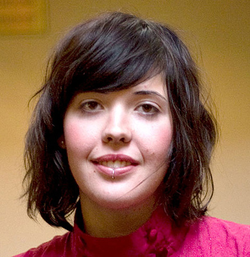 Chelsea McMullan Chelsea McMullan A Canadian filmmaker and artist, CHELSEA MCMULLAN’S films have premiered at the Toronto International Film Festival, and have been screened on the international festival circuit. Effortlessly moving between documentary and fiction, her work has been described as ‘keenly observed, elegant, and profound,’ solidifying her reputation as ‘talent to watch.’ Chelsea’s award-winning shorts have been featured on NOWNESS, DAZED DIGITIAL, VICE and in VOGUE ITALIA. In 2010, her series of live portraits, Chaine, created in collaboration with Russian photographer Margo Ovcheranko, premiered at the New York Photography Festival. Chelsea has been an artist in residency at the prominent Italian creative think tank, FABRICA, where she made the Genie award nominated film Derailments. She's recently completed her first feature length film, a documentary-musical about transgendered musician Rae Spoon entitled My Prairie Home, marking her third collaboration with the National Film Board of Canada. McMullan is a member of the artist co-operative What Matters Most, a group of culture-makers with representation based out of Los Angeles. RUSTY TALK WITH CHELSEA MCMULLAN Sarah Galea-Davis: How did you first get into filmmaking? Chelsea McMullan: I don't think I've found a way to say this yet that doesn't set off my precocious detector, but I wanted to make films from a young age. There's no great story or anything, just a progression from my parents' camcorder to studying film at York University in Toronto straight out of high school. Part of me wishes I'd came to film later because I think it would have been great to study something like philosophy or psychology first. At the same time though, I still work with the same people I met in my undergrad. SGD: Was there a writer or filmmaker that had a big impact on you? CM: On a personal level Jennifer Baichwal has been hugely influential. I interned with her and her husband Nick de Pencier right out of film school and despite being a thoroughly wretched production coordinator/researcher, they've both been so patient and generous with me over the years. I was occupying a corner of their office rent-free for like four years. I used to sleep on their couch, in the editing suite, when I was up late writing a grant. Also they are fucking awesome filmmakers, and over the years I've been able to watch their process and learn from them, while deeply engaging with pragmatic, ethical, and philosophical issues around the films I'm making. My absolute favourite filmmaker is Rainer Werner Fassbinder. Hands down, end of discussion, to a very obsessive extent. A few years back in Berlin, I bought a book, which is comprised of a still image of every frame in Berlin Alexander Platz. It's like 50 lbs, and my baggage was obscenely overweight, but it was totally worth it. I would say it's one of my most cherished possessions. Actually, the mayor of the town I grew up in was his cousin. I asked him about it once, and he told me a wild story about spending time with Rainer. I think it was supposed to be a cautionary tale. SGD: What is your favourite part of the filmmaking process? CM: I find that I'm sort of anxiety ridden through the whole process. Though if I have to choose my favorite part, it is probably watching rushes. There is still so much promise and nothing has gone wrong yet, but you’re past the soul-destroying production hump. It's a nice purgatorial state before you have to pull your baby apart and sacrifice it to keep the gods happy. SGD: What is the best filmmaking advice you've received? CM: Once something really bad had happened to the main subject of one of my films. His wife had a horrible brain aneurism and was in the hospital. I was young, so I thought the film was over and was ready to throw in the towel. I phoned Jennifer and told her about the situation, and she was like "Chelsea, this is your job. This is what being a documentary filmmaker is." I've never forgotten that. The times it feels most difficult and awkward to shoot are the times when usually it is most important because those are the moments of people's lives that we don't really share enough. Also more often than not people want their tragedies documented. They want to feel like people are experiencing with them, that there's value in their loss. SGD: Your work spans the genres of documentary and experimental filmmaking. Do you approach the writing/creation process differently when it comes to your non-fiction work? CM: I never set out to make documentary, fiction, or experimental films. A subject just crosses my path, and I follow it down the rabbit hole. I also feel like my work usually sits in some space of hybridity. I've never sought out a subject for a film, it always comes to me, and then I just try to tell the story in the best way I know how. The genre, the length, the style for me are all dictated by the subject matter. SGD: Tell us about your current documentary that is being released in November? CM: The NFB hired an actual writer to explain it in a concise and inviting fashion. Know that it is a passion project that Rae and I have been working on for the past four years or so together. Rae is a good friend and this was an important project for me. SYNOPSIS: MY PRAIRIE HOME In Chelsea McMullan’s documentary-musical, My Prairie Home, indie singer Rae Spoon takes us on a playful, meditative, and at times melancholic journey. Set against majestic images of the infinite expanses of the Canadian prairies, Spoon sweetly croons us through their queer and musical coming of age. Interviews, performances, and music sequences reveal Spoon’s inspiring process of building a life of their own, as a trans person and as a musician. TRAILER: 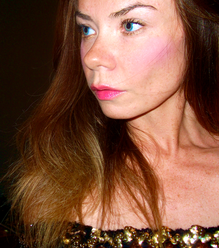 Nadia Litz Nadia Litz is an award-winning Canadian actress and director. After her debut at Cannes in the award-winning film The Five Senses, Maclean’s magazine voted her “One to Watch” for the new millennium. She played Sam Shepard’s daughter in 2002’s After The Harvest and was nominated for a Gemini Award for Best Actress for that role. In 2007 she won the Vancouver’s Critics Award for her role in Reg Harkema’s Monkey Warfare. Her 2010 short film, How To Rid Your Lover Of A Negative Emotion Caused By You!, produced by the Canadian Film Centre where she was a director-in- residence, premiered at the Toronto International Film Festival in 2010, has played over a dozen film festivals throughout the US, Canadian and internationally, including out-of-competition at the Cannes Court Metrage, winning best short at Austin’s Fantastic Fest 2011. In 2012 Litz was featured on the prestigious Wholphin anthology, alongside Jay Duplass (Jeff Who Lives At Home) and Sean Durkin (Martha Marcy May Marlene). Recently Litz completed an experimental short doc on Canada’s revered and controversial Right Honorable Adrienne Clarkson, which makes its world premiere at VIFF in September 2012. Her first feature Hotel Congress, a comedy-of manners that takes place in a Tucson hotel is in post-production. While her second feature, a love story that takes place in a suicide forest in Japan, goes to camera in 2013. You can follow her on Twitter. RUSTY TALK WITH NADIA LITZ Kathryn Mockler: What is your first memory of writing creatively? Nadia Litz: In grade school we had to choose a story of a historical figure, do research on the figure, and then make a book on that figure. We had to write it, illustrate it, and even bind the book ourselves. My dad had taken me to go and see Milos Forman's Amadeus and I became obsessed with it and subsequently Mozart, so I chose to write my "book" on him. I called it "Wolfie". KM: When did you first start directing and writing for film? NL: I tend to do a lot of "research" before I try something. I read screenwriting books and had taken classes, and I had been aimlessly writing pretend scripts and treatments for a while—maybe 10 years. But, it wasn't until my last year of university studying Cinema Studies that I directed. It was a 3-minute experimental short that was an assignment in a directing for non-majors class. It landed me a spot as a director-in-residence at the Canadian Film Center months later. That was in 2009. Which proves I'm a noobie and you should probably stop reading this. KM: How do you think your acting background influences or affects your directing and writing? NL: I think it does but it is hard to articulate how. I suppose I trust what good actors can bring to a moment, so when I was first writing, I tended to underwrite (according to producers and story editors). I continue to learn the balance of what should be on the page and what shouldn't be. I was just re-reading Allan Ball's American Beauty, and in the script he writes a stage direction for the character Carolyn: "Even when she slept she had a look of determination on her face." That kind of writing is gold for an actor. As an actor if I read that one line, I would understand the character, so I try to be mindful of things like that when I write and when I direct. The script for Butch Cassidy and the Sundance Kid is also full of stage direction like that. Simple editorial clues that will be an anchor for an actor, without force feeding it. I don't mind breaking what might be considered screenwriting convention in order to make a script come alive for an actor; however, I do believe in a firm structure as a base. KM: What inspires the stories you tell? NL: I have noticed that locations seem to inspire the first grain of an idea for me. However, I hope that whatever inspires me at a given time will evolve as I do as a writer. I think the first few stories we tell tend to have a personal element. Filmmakers can seem like we want our trajectory to be the indie personal story root because when we are first starting out, we have budgetary constraints that lend themselves to personal stories. I love including personal elements in my stories, little nods to my life, but I have yet to ever want to tell the truth about my life on film. My preference is to look around me. I also like emotionalizing things that are "concepts". Also, I get a bunch of ideas via the Sunday Times. Too many, really, it's shameful. KM: Was there a writer or filmmaker that had a big impact on you? NL: Kurt Vonnegut was the first great literary writer I read as a teenager. He had those naive drawings in a few of his novels, which always seemed subversive to high art literature and cinematic to me for some reason. His voice resonates with me still. He is wry and detached but wholly emotional to me. His satire is never mean. He points out the meanness of the world because his heart is broken that it is like that. That's how I see him. I relate to that way of thinking. His voice/tone is highly original. The list is too long for filmmakers. However most of the films I love tend to be some form of comedy-of-manners in a broad stroke way. I think a lot of Kubrick's films, for example, are comedy-of-manners so I have a broad idea about that genre. Bunuel, Oshima, Ozu, Rhomer, Kubrick, Cohen Brothers, Whit Stillman, Coppola (Sofia)—usual suspects. KM: When you are directing films that you didn't write—what is the process like? Do you have any advice about what screenwriters can expect when working with a director? NL: I love the process of directing others' work. It's a whole other ballgame then directing your own work, and both are equally satisfying for different reasons. In directing another screenwriter's script you have to find clever ways of making it meaningful to you. It's a challenge to have one more person you need to satisfy. It can be exciting that your only way to tell the story is visually/emotionally. With the short “How To Rid Your Lover of a Negative Emotion Caused By You!” it was a case of having two very strong voices in the mix—the writer Ryan Cavan and mine as a director. It's successful because both visions were honored. KM: When writing your own scripts what is the writing process like for you? How do you approach revision? NL: I love to write. It is a joy. I don't feel bogged down by it. If I hit a block, it's a challenge and I like challenge. The thing that gets me down is when I lose interest in something that I have been working on for some time. Do you try to revive the interest or do you let it go? That's an obstacle for sure. For revisions I like to have a plan. I'll start with strengthening the peripheral characters and work my way towards the protagonist. I just read these great tips from James Schamus, who had some harebrained ideas for revisions I think I might try. Revisions are a drag, but he had these thoughts about standing a draft on its head that seemed very smart. KM: When getting notes from producers—what do you do when you get a note that you don't like or agree with on your script? NL: Only take good ideas and only from people you respect. You know your script and characters better than anyone. People will try to convince to take their note by saying things like "you're too close to the script". I say, "yes!" It is a good thing to be very close to your script. Also, when you are starting out people will tell you are suppose to consider all producer notes, because you are new. Like it is a manners thing. This is what I think: your script is the thing you are the expert on. Have the conversation, if only as a way to articulate why you don't agree with their note, but ultimately you make the choice. You are the CEO of your script and a CEO needs to believe in the company and lead it. No one calls a CEO 'precious' when they believe in their company, so don't let words like that deter you...Now, if you're a bad CEO, your company will fail and the public will let you know quite quickly and you won't be allowed to be CEO anymore! So, you have to be a good CEO! But, ultimately I'm all for screenwriters, respectfully, standing up for a choice. Most producers in the real world respect people who can articulate and communicate a vision. It is your responsibility to instill trust in your producers and funders about that choice, however. Also, that was a really long CEO metaphor. I hope it was clear...Also, if you are a gun-for-hire, it's a totally different thing. Then you apply the note and you find your way into the note. Case closed. KM: What are you working on now? NL: I just finished shooting my first feature called Hotel Congress. I had been in development on what was suppose to be my first feature The People Garden when this opportunity to make a film for no money presented itself. Hotel Congress is a film full of things I swore I would never do. I wrote it in 12 days. Very little revisions. Very talky. We shot the film in 40 hours. I star in it. I co-produced it. I co-directed it with Michel Kandinsky. Did I mention we shot the entire feature in 40 hours? We shot it on location in Tucson Arizona in a hotel called Hotel Congress. It is a romantic comedy-of-manners that we shot in 40 hours. We're in the edit now. We don't know if we're crazy, but so far we love it and think it's quite charming, actually. It was made with so much drive and love by an insular team of my favorite co-horts. It would be impossible not to love a feature film. That you shot. In forty hours. In the desert. I hope to make my film The People Garden next year. With a smidge more time. HOTEL CONGRESS Feature Film, 2012 Hotel Congress Trailer from Sofia Francis on Vimeo. Nadia Litz and Michel Kandinsky – Directors’ Statement “Instead of bashfully wearing its microscopic budget as a badge of honor, Nadia Litz and Michel Kandinsky’s HOTEL CONGRESS aims for a genuine economy of craft. Ironically, in a project devised and executed in the shadows of the Canadian production stream, it’s a combination of old fashion virtues – a resonant location, clever camera placement, and a worthily wordy screenplay – that elevates Litz and Kandinsky’s first feature debut beyond a novelty item.” –Adam Nayman (Cinema Scope, The Grid) Hotel Congress is a tender comedy-of-manners about two people who meet in a hotel famous for its nefarious associations to Depression era bank robber John Dillinger. Sofia and Francis try not to have an affair, while trying to find true love. The film comically deals with ethics in an unethical situation and could aptly be re-titled “What Happens When Cynics Try To Care.” Or “Why John Dillinger is Not A Bad Guy.” The film was Shot for a $1000, in under 40 hours at the historic Hotel Congress in Tucson Arizona. Litz had been to the hotel 7 years prior to see the post-punk band Interpol play a show in the parking lot. She was struck by the dichotomous feeling of isolation and warmth the hotel had. The way the hotel felt stuck in time. Nadia Litz (writer, co-director, co-producer, actress): This film was under ‘willing duress’ from the start. I say willing because we wanted to prove a point in this very competitive market: you just need some smarts and an air tight work ethic to make an interesting film. Film at its best is about ideas and relatable emotion. Let that be the end of budget and time constraints. When you start to think of what you can do for $1000, you quickly realize the script can save you. In writing this particular project, I focused on films that we all deeply admired the dialogue of (because dialogue doesn’t need lighting!) and why those films work. Obviously we love Mamet and Woody Allen and Hal Hartley and of recent years Lena Dunham comes to mind. We were going through a major Sturges period – hence the 4:3 - his films are simply shot, but beautifully romantic yet not at all ‘twee’….But, Whit Stillman is still the quintessential dialogue screenwriter for me. His characters are satirical, but his films are tender in a way that sneaks up on you. Could the Chris Eigeman character be more of a jerk, that you ultimately feel for, because a) he is truly stuck in his own jerk-ness and b)he’s the least hypocritical character in the Stillman world. I had him in mind for my character Sofia. Stillman’s ideas and his modern philosophy (or philosophy of modernity) are what you care about in his films. Ideas and philosophies don’t inherently cost money so they bode well for indie filmmaking. That seemed like the highest bar to work towards. I’m not into improvisation, shooting everything and finding the film in the edit for indie filmmaking. I think you need to be more meticulous and disciplined in the basics of the craft as an indie filmmaker I wrote the film round the clock in twelve days. We were shooting three weeks later. Every word we said is in the original script. It felt mischievous to do it that way, to not belabor the process with second-guessing and rewrites. Just write it and shoot it. When you don’t try to fit into a preconceived mold, the mode of storytelling becomes more interesting. You feel uncensored. Michel Kandinsky: (co-director, co-producer) For me, the film is about two people trapped by their own erudite, iconoclast self-awareness. They know what to say at the appropriate moment and how to say it in a clever way but this knowledge keeps them from feeling as deeply as they could. I approach film as an intuitive medium, one in which too much thought gets in the way when time on set is spent trusting your intuition. It’s the opposite of what the characters in the film are doing, until they do it…And then once they trust in it they become the kind of love they aspire to, without even realizing it. This was the first time I had co-directed anything. The remarkably short amount of time that we had to shoot this film kept us from too much discussion once we were on set. We simply didn’t have the ability to talk things out once we started shooting. We had to trust the script and our base instincts, keep out the temptation to over-think. I think that comes through in the finished product. There’s an energy there that I find very empowering. We knew we had to just start. Starring Nadia Litz Philip Riccio Director Nadia Litz Michel Kandinsky Writer Nadia Litz Producer Nadia Litz Michel Kandinsky Philip Riccio & Daniel Bekerman Exec Producer Ingrid Veninger Stacey Donen Cinematographer Daniel Grant Editor Jonathan Eagan Sound Editing Gabe Knox Song by Paul Banks HOW TO RID YOUR LOVER OF A NEGATIVE EMOTION CAUSED BY YOU! Short Film, 2010 Produced by the Canadian Film Centre Directed By: Nadia Litz Starring: Sarah Allen & Joe Cobden Screenplay By: Ryan Cavan Produced By: Heather K. Dahlstrom & Daniel Bekerman Edited By: Alexandre-Nicholas Giffard Director of Photography: Daniel Grant Production Design By: Nazgol Goshtasbpour Description Love can make us do weird things. Sadie does a weird thing. She does it to her boyfriend Dennis. Keep in mind she only wants what's best for both of them—a perfect relationship. It could be the perfect relationship, too, as long as nobody bleeds to death. 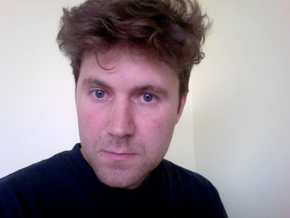 Jeffrey St. Jules Jeffrey St. Jules Jeffrey St. Jules is a Canadian filmmaker. His films include THE SADNESS OF JOHNSON JOE JANGLES, which won him Best Emerging Filmmaker at the Worldwide Short Film Festival and the Genie-nominated short THE TRAGIC STORY OF NLING, which screened at the Sundance Film Festival. Both films premiered at the Toronto International Film Festival. He is the first and only Canadian to have been selected for the CANNES FESTIVAL RESIDENCE in Paris. He is currently in development with SCYTHIA FILMS on a musical film entitled BANG BANG BABY. His latest project LET THE DAYLIGHT INTO THE SWAMP is a 3D documentary/fiction that recently had it's premiere at TIFF. RUSTY TALK WITH JEFFREY ST. JULES Kathryn Mockler: How did you first get into filmmaking? Jeffrey St. Jules: In high school, we would go to an old fort called York Redoubt in Halifax to smoke pot and think about the craziest things we could put on film. I never actually filmed anything or even took photographs, but for some reason, I thought I could be a good filmmaker. Drugs can do that. There seemed to be so many possibilities inherent in the medium that people never bothered to try, and I wanted to try them. Then in university, I started trying things. I found out that tons of my ideas didn’t work, but occasionally something unique that I thought of worked, and I felt like it hadn’t been done before and that was exciting. I should mention that by the time I started making films, I didn’t even smoke pot anymore. KM: What is the writing process like for you? What would be involved in a typical writing day for you? JSJ: If I have the luxury, I like to be a 9-5er, or rather a 9-12er. In the morning my head is the most clear, so I like to write then. I feel I can kickstart inspiration if need be. The best way for me to do this, is to go on the elliptical machine and stare at a blank wall, because my body is occupied but my mind is not. KM: How do you approach revision? JSJ: With feedback. I need outside opinions to reshape the way I think about the script. I have a tendency to be lazy and prematurely satisfied if left to my own devices, so I need a trusted person to tell me what sucks. A complete drubbing can often be the most inspiring thing for my writing. KM: Was there a writer or filmmaker that had a big impact on you? JSJ: In my coming-of-age days it was David Lynch and Jack Kerouac. Probably because they made it feel like you could just make stuff that inspired you and you didn’t have to follow rules. They also both operate on an intuitive level, which I have always tried to stay connected to. KM: What is the best piece of writing advice you've received that you actually use? JSJ: Have at least a little bit of a plan before you start writing a story, or you will have to do a lot more work later in revisions. Sounds obvious, but when you buy into the romanticism of Jack Kerouac early on, you might not think you need to. KM: Can you describe your National Film Board project Let The Daylight Into the Swamp? JSJ: It’s a stereoscopic 3D documentary/fiction film about my grandparents. I suppose I would call it an exploration into the unknowability of our family histories. KM: What are you working on now? JSJ: A rock-n-roll musical about the hallucinations of a small town girl. HERE'S A CLIP FROM JEFFREY ST. JULES LATEST FILM: LET THE DAYLIGHT INTO THE SWAMP NFB (2012) In Let the Daylight into the Swamp, filmmaker Jeffrey St. Jules reconstructs the story of his grandparents and their rugged frontier existence in the logging towns of Northern Ontario. St. Jules' tale unfolds on the bumpy back roads of life, where ultimately his family was dislodged. Blending fiction and documentary, myth and fact, comedy and tragedy, all rendered in 3D, St. Jules stitches together an elusive, fractured family history. Yet the joie de vivre of Franco-Ontarian life tempers the hardship and regret, infusing this visually inventive film with both joy and heartbreak. OTHER SHORT FILMS BY JEFFREY ST. JULES
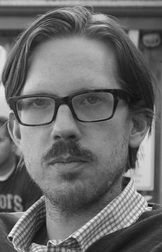 Michael Vass Photo by June Pak Michael Vass is a filmmaker and writer based in Toronto. His award-winning short films have screened at numerous film festivals and have been broadcast internationally. His critical writings have appeared in the film journal Cineaction and the Philadelphia-based publication MACHETE. Michael received his BFA from Simon Fraser University and his MFA from York University. He is also an alumnus of the Canadian Film Centre. RUSTY TALK WITH MICHAEL VASS Kathryn Mockler: How did you first get into filmmaking? Michael Vass: I’m not completely sure. As a child I think I was drawn to performing—for instance, I loved stand up comedy at what now seems a weirdly young age (I couldn’t possibly have understood most of the jokes)—but I don’t think I was ever completely comfortable performing myself, at least not after a certain age. So I started writing stories then making videos, probably initially as a way of performing out of sight. When I was 11 or so, I started making little home movies with my friends and my sister. We’d make parody sequels for movies that were popular at the time. I think we made Home Alone 2 and Die Hard 3 (which we called Die the Hardest) before either sequel really existed. Since then I’ve just kept making things. As a teenager my interest in film intensified, then I went to film school where I was exposed to all kinds of films that fascinated and excited me. KM: Was there a writer or filmmaker that had a big impact on you? MV: There are too many too name, and it tends to shift somewhat depending on what I’m working on. For my most recent project, Vancouver #1-13 (Notes for a report…), I was influenced mostly by filmmakers working in the somewhat amorphous genre that’s sometimes called the essay film, which has long fascinated me. The term itself isn’t that important, it’s just a way of grouping together a kind of film that’s always been around, which combines elements of fiction and documentary, and which tends to have a significant writing component—usually in the form of a first person voice-over. It’s generally a more self-reflexive and personal way of using various cinematic techniques, and it often addresses somewhat political themes, directly or indirectly. Film/video-makers like Chris Marker, Jean-Pierre Gorin, Jean-Luc Godard, Harun Farocki, and John Smith had a particularly strong impact on me as I was working on the film, as did the writers Robert Musil, W.G. Sebald, Thomas Bernhard, and Roberto Bolano. KM: Can you describe your current film project that's screening in Philadelphia? MV: It’s called Vancouver #1-13 (Notes for a report…) and, as I mentioned, it’s a kind of essay film, which mixes documentary and fiction to examine security and protest in the society of the spectacle. It uses documentary footage from the 2010 Vancouver Olympics and the G20 debacle in Toronto, and adds a voice-over by a fictional intelligence agent analyzing the footage. It is currently screening as an installation in the group exhibition “First Among Equals” at the Institute for Contemporary Art in Philadelphia (April 11-22). My participation in show came about because of my involvement with the Philadelphia-based gallery Marginal Utility and the Machete Group which jointly puts out the publication MACHETE, for which I’ve been writing about film for the past couple years. KM: What is the best thing about being a filmmaker and the worst thing? MV: The best thing about being an artist of any kind is that it lets you structure your life around engaging with the world and your experiences and interests on your own terms, or at least on terms of your choosing—creatively, critically, reflectively…however you want. The worst thing is that this kind of activity rarely pays the bills, so usually you have to find some other way of making a living. Sometimes this can be something tangentially related to your activities as an artist (like teaching), or sometimes it is something completely unrelated, but either way it tends to eat up a lot of time and energy you’d rather be spending working on your own projects. This financial downside is exponentially worse as a filmmaker because filmmaking is so expense, logistically complicated, and time consuming, so if you want to make your own films, it can obviously be quite difficult. But artists shouldn’t whine too much about jobs and money – almost everyone hates there job and would rather not be doing it, at least we have something we want to be doing. KM: Your funniest filmmaking moment. MV: I directed a film at the Canadian Film Centre in 2006 called Skinheads. The film is a dark comedy and isn’t exactly about actual skinheads in any real way, it just appropriates some of the iconography of skinhead culture for other purposes. We put a trailer on YouTube to promote the film at festivals, etc. However, we didn’t anticipate that there are a lot of actual skinheads all over the world searching online for skinhead related stuff. The trailer has received a ton of views in the past year, along with some affronted comments by Neo-Nazi types. Somehow the trailer must have gone viral in some minor way recently on skinhead sites or something and has generated some negative attention. Maybe that’s not ha-ha funny, but I find it kind of amusing—as long is there is an ocean between the offended skinheads and me. Vancouver #1-13 (Notes for a Report...) currently screening as an installation in the group exhibition “First Among Equals” at the Institute for Contemporary Art in Philadelphia (April 11-22).
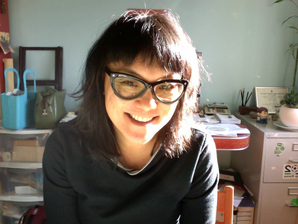 Mina Shum Multiple-award winning filmmaker Mina Shum has written and directed three feature films. Born in Hong Kong and raised in Vancouver, Canada, The New York Times calls Shum's work "wry and winning". As a director resident at the Canadian Film Centre, Shum developed her first feature-length film Double Happiness, which premiered at the 1994 Toronto International Film Festival, receiving the Special Jury Citation for Best Canadian Feature Film and tying in third place with Kieslowski for the Toronto Metro Media Prize. Double Happinessgarnered Canada’s highest film honours, winning Genie Awards for Best Actress (Sandra Oh) and Best Editing (Alison Grace) with additional nominations for Best Picture, Best Direction, Best Screenplay and Best Cinematography. It also won 1995 Berlin Film Festival prize for Best First Feature, as well the Audience Award at the Torino Film Festival in 1994. After it’s US premiere at Sundance, it was released theatrically in the U.S. by Fine Line Features in 1995. Her second feature Drive, She Said premiered at the Toronto Film Festival in 1997. The film was invited to the competition section of the Turin Delle Donne Film Festival in 1998. Shum’s third feature film,Long Life, Happiness and Prosperity premiered at the 2002 Toronto Film Festival and played to sold out audiences at the 2003 Sundance Film Festival. It won a Special Citation for Best Screenplay at the Vancouver Film Festival. It will be released theatrically in Canada by Odeon Films and in the U.S. by Film Movement. Shum has written and directed several short films, including Picture Perfect, which was nominated for Best Short Drama at the 1989 Yorkton Film Festival, Shortchanged, Love In, Hunger, Thirsty and Me, Momand Mona which won Special Jury Citation for Best Canadian Short at the 1993 Toronto Film Festival. Her 2011 web short, Hip Hop Mom has garnered thousands of hits and can be viewed for free at www.minashum.com. Shum directed the television movie, Mob Princess for Brightlight Pictures/W Network. Her episodic directing work includes: About A Girl, Noah’s Arc, Exes and Oh’s, Bliss, TheShield Stories and Da Vinci’s Inquest for which she was nominated for a Director’s Guild Award. Her episodic work has been seen on CTV, Global, Nickelodeon, CBC, N, Logo/MTV, Showcase and Lifetime. She is currently writing and developing her next feature film, Two of Me, with Brightlight Pictures, as well as writing and developing other feature projects including, The Lotus (co-written with Dennis Foon). RUSTY TALK WITH MINA SHUM Kathryn Mockler: How did you first get into filmmaking? Mina Shum: When I was 7, I got down on one knee, spread my arms wide like Al Jolson and declared "I want to be in show business." At 12, I started my first journal and wrote everything I thought, felt, and heard down. I would copy things I'd overheard on the bus ride home, word for word to examine the patter of speech and the subtext of a banal conversation between two ladies about a cupcake recipe. In grade 9, I was failing my knitting class and transferred to Drama and that was the beginning of my official training as a filmmaker. I went to theatre school at UBC, got a film diploma after my BA, and continue to study and practice the craft. KM: Where do you get your ideas from or what or who inspires you? MS: I am a voracious consumer of ideas, movies, art, theatre, music, dance, fiction and non-fiction. I read interviews with people I've never heard of. And I listen to both friends and strangers speak. I live entirely, throw myself into situations, get my heart broken, soar with infatuations. And somehow all that gets funneled through my guiding intention, which is to reflect and reveal how we can be happier. How to live more authentically, how to make the most out of this one life. So, how does this hodge-podge of thoughts gets distilled through my next feature? Two of Me is an irreverent romantic comedy about an overworked 35 year old super woman (two kids, live-in-mother-in-law, husband, high pressure job, trying to get promotion) and she's granted a wish for "two of me" except the other "me" is ten years younger when she was a no-good indie rock musician. It's a film about who you once were and who you've become and the disconnect that often occurs when we're busy living life! At its heart, it's about surppressing our true nature (which I think all my films are about). KM: What is the writing process like for you? MS: I get hooked on an idea, a question and I write.It starts in the title which I believe should say what's the essential theme/idea behind the movie; it starts with a good title. Then I write the three-sentence pitch. If I can do that, I move on to a proposal that is half director's vision and writer's beats. But after that I work on my treatment, which is beating out the film pretty well. And at this point it's the writer's hat I'm wearing. The writer has to deliver on the promise to the director. Being both writer/director, I have to know when to wear which hat. The director in me is a heavy taskmaster and will continue to make me (the writer) work the script until it sings and I take it over as a director. And then when I direct the film, I will continue rewriting bits even in the sound mix of the film. KM: How do you approach revision? MS: I rewrite until you are watching the movie in a theatre. When I say that, I mean in marketing, in my interviews and in my q and a. I assume that all the notes I get, is just gonna make the film better. I do reject notes. But if the same note is coming over and over, I take notice. KM: Writers/filmmakers often have to face a great deal of rejection, especially when they first start out. Do you have any advice for aspiring filmmakers on coping with this? MS: Nothing is ever lost when you practice. I like to think of all of life as a practice. Malcom Gladwell says it takes 10,000 hours to get really good at something. Clock your 10,000 hours. Keep working on it. I write and direct everyday even if it's just in my mind, toying with concepts or even a note to a friend. Trust the path. KM: What is the best thing about being a filmmaker and/or writer and the worst thing? MS: Best thing about being a filmmaker, making a film. Worst thing: waiting for the funding to make a film. But even as I write that, I know that I have to "practice" making that part fun, part of the process. At best it takes fours years to go from thought to you seeing it on the big screen. That's four years of living, breathing and waiting. Or should I say "practicing"?  From the short film HIP HOP MOM Photo by Matt Lyons A SHORT FILM BY MINA SHUM Check out Mina Shum's latest 4-minute short Hip Hop Mom. Synopsis When two alpha moms fight over a parking spot, they reveal their secret identities, and it's a hip hop battle royale!  Renuka Jeyapalan _ An award winning filmmaker and graduate of the Canadian Film Centre’s Directors’ Lab, Renuka Jeyapalan is currently developing her feature film projects, How To Go To A Wedding Alone and One Lovely Night. Her short film Big Girl premiered at the 2005 Toronto International Film Festival and was awarded the ShortCuts Canada Best Short Film Award. Since then, Big Girl has screened at over thirty-five film festivals around the world—including the Berlin International Film Festival, the Tribeca Film Festival and the San Francisco International Film Festival—and was nominated for a 2007 Genie Award for Best Live-Action Short Film. In 2010, Renuka was awarded the WIFT-T Kodak New Vision Mentorship Award which included a creative mentorship with director Catherine Hardwicke (Thirteen, Twilight). Renuka has an Honours Bachelor of Science degree in Biochemistry from the University of Toronto. RUSTY TALK WITH RENUKA JEYAPALAN Kathryn Mockler: How did you first come to filmmaking? Renuka Jeyapalan: I've always loved movies and I think since I was a kid always thought of filmmaking as a "dream job", but never truly considered it as a real option for myself. I was on a path towards becoming a doctor, but during my second year at the University of Toronto, I was able to fit in a film class amongst my science courses. The course was called Contemporary Popular American Film, and I remember listening to the professor analyze the opening wedding sequence in The Godfather and that was it, I was hooked. That class really cracked open the form and craft of filmmaking for me, and I remember thinking, "I can do that!". And while I did finish my degree in Biochemistry, from that moment on in my heart and mind, I was committed to becoming a filmmaker. KM: What keeps you going as a writer/filmmaker? RJ: I think the hardest thing is figuring out your passion and what you want to do career-wise. But once you know, pursuing anything else is just inconceivable. And that's how I feel about filmmaking. When I'm making, watching or even talking about movies, I'm exactly the person that I want to be. I'm exactly myself. To give up is just not an option. And while filmmaking is a very difficult path, if that is your true passion, I don't think you really have any other choice than to pursue it with everything you've got. KM: What do you find the most difficult thing about writing scripts and the best thing about writing scripts? RJ: Everything about writing scripts is difficult! The whole thing. I once heard a radio interview with the author Philip Roth and he perfectly articulated why writing is so hard. He said that writing is the most difficult thing to do because it's lonely, painful and no one can help you—only you can tell the story, and you basically have to drag it out of you. And even though you may have written before, when you start a new story, you have never told THAT story before so it always feels like you are starting from nothing, over and over again. No matter how many screenplays, books, short stories, poems or articles you have written, you always feel like a novice. For me, the best thing about writing is that you get to express yourself under the guise of a story. That you have the power to say something meaningful, convey an idea or impart an emotion to an audience. Most of the time, you struggle with how to do this elegantly and with craft, but when it works, it's a great feeling. KM: When writing scripts what is the revision process like for you? RJ: Once I finish a draft, I put it aside for a while. I get notes from my producers, friends who I trust. and I also make my own notes about what needs work. When I feel like I have enough distance away from it, I'll start a page one re-write, only using the original draft as a guide. I aim to re-write the entire script within 10 days, with each day containing certain goal markers. For a feature screenplay, for example, on the first of the 10 days, I'll re-write the first 10 pages or the "ordinary world" of the protagonist. And on the second day, I'll re-write the next 15 pages, including the inciting incident up to the end of Act I and so on. I find that this process lets me not only incorporate new changes, but to free myself from getting too attached to scenes in the original draft. This process seems to facilitate my writing to feel more organic and fresh each time I work on a new draft. KM: What writers or filmmakers would you recommend to new screenwriters? RJ: I don't know if there are any specific writers or filmmakers that I would recommend, but I always find listening to the first person stories of filmmakers and how they wrote or made their own films to be interesting and helpful. I find that books (eg. My First Movie), DVD commentaries, podcasts (KCRW's The Treatment, The Q&A with Jeff Goldsmith) which interview the actual filmmakers on their process can be quite inspiring. KM: A piece of advice for new writers and filmmakers? RJ: Stay passionate, stay true to yourself and your vision, and above all don't give up! KM: Your funniest film/writing moment. RJ: I tend to write in coffee shops most of the time, and I remember writing at my local café one Saturday afternoon on College Street a couple years ago. It just so happened that it was during the World Cup and this café was packed with enthusiastic Portuguese soccer fans watching an important match. At one point, an old man came up to me and with this offended expression and asked me, "How can you work here?!?" And it was only at that moment, that I realized I didn't even notice the commotion around me. All these fans were screaming and cheering and glued to this big important game and there I was…so focused on my writing that I was clueless to it all. KM: What are you working on now? RJ: I'm currently living in Los Angeles in order to focus on writing and to get inspired. But I have a feature film called How to go to a Wedding Alone that is in development with the Toronto-based production company Gearshift Films and Telefilm Canada. And I've just finished a new feature screenplay and a short film script that I'm looking to make.  A SHORT FILM BY RENUKA JEYAPALAN Big Girl, short film Produced by The Canadian Film Centre & NBC-Universal, 2005 Synopsis A bittersweet battle of wills develops between nine-year-old Josephine and her mother's new boyfriend in this poignant tale of modern family politics. Screenings Screened at 25 festivals worldwide including the Berlin International Film Festival, the Tribeca Film Festival and the Toronto International Film Festival. Awards 2007 Genie Nominee - Best Live Action Short Drama 2006 ACTRA Award for Outstanding Performance – Female (Samantha Weinstein Best Short Film - 2005 Toronto International Film Festival _ 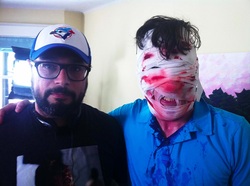 Vivieno Caldinelli Vivieno Caldinelli Vivieno Caldinelli's award winning work has appeared on CBC, CTV, CityTV, The Comedy Network, Bravo!, and TMN. Vivieno is an alumnus of both the Berlinale Talent Campus of the Berlin International Film Festival and the Toronto International Film Festival Talent Lab. In 2005-2006, Vivieno participated in the Canadian Film Centre’s Directors Lab. His film, If I See Randy Again, Do You Want Me To Hit Him With The Axe? was produced with the CFC's NBC/Universal Short Dramatic Film Program. It was invited to over 25 festivals around the world including it’s premiere at the 2006 Toronto International Film Festival. It was nominated for over 10 awards including for 4 nominations at the 2007 Canadian Comedy Awards. In 2009, Vivieno was the Creative Producer, and served as both a Writer and Director on the Comedy Network Series, Hotbox. Currently, Vivieno is in development with Corus, Telefilm, JFL, and CFC Comedy Lab with his feature film, The House They Screamed In, and he just finished directing the Comedy Network series Picnicface. RUSTY TALK WITH VIVIENO CALDINELLI How did you first come to filmmaking? From a very young age I was obsessed with movies and television. It was just a huge part of my life growing up. There was no real choice; it was something that I was going to have to do and become. What keeps you going as a writer/filmmaker? Without filmmaking and writing, I'm worth about $11 an hour in the real world. I have no other skills. Honestly. I have dug myself in such a deep hole that I have no other options other than to succeed. It's a lousy plan, but it's working so far. I am fortunate that I am very passionate and absolutely love what I do. Very few people get to live their "dream job". So I'm blessed in that regard. When writing scripts, what is the revision process like for you? It's all about layering draft after draft. With each revision, I fill out of the characters, trim needless dialogue and exposition, revise scenes, etc. It's almost as if each draft of the script is a transparency sheet with a part of a drawing on it. Writing draft after draft is like putting down a new sheet of transparency over the old one. Each sheet with another part of the drawing on it, complements and builds on the original until finally you're left with a perfect picture. How did you deal with rejection when you first started out? It was tough at first but then you learn to deal with it. You get thinker skin. You learn to stand by your ideas and writin but at the same time listen to criticism. It's very important to listen to what people think about your work. But it's up to you to take that criticism, filter it, and use it to strengthen you work. What filmmakers would you recommend to new screenwriters? I just would say watch what inspires you. Watch who you connect with. Who you feel best captures and complement your vision. These are you formative years, and the filmmakers and writers that influence you early will continue to do so for the rest of your lives. Others will come and go, but who and what inspires you now, will play a huge role in shaping what you will become later in your career. Is there filmmaker that had a significant impact on your career? This kinda connects with the last question. Growing up I watched a lot of Mel Brooks and John Landis. I absolutely loved anything they did. All my early films and writing were inspired by them. I have since had other influences, but those core influences that I had early on in my life continue to impact my career. A piece of advice for new writers and filmmakers? Just keep writing and making films. That's the only way you can get better. Creating and completing project after project is the absolute best experience to learn from. 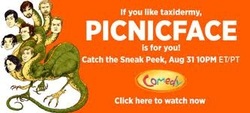 VIVIENO CALDINELLI'S RECENT PROJECT PICNICFACE on the comedy network Picnicface (not Picnicfeast) is coming at you with the Series Premiere Sept. 21 at 10:30pm et/pt. Picnicface is a fast-paced, mash-up comedy mixing a contemporary, Pythonesque animation and absurd sketch comedy. Hailing from Halifax, Nova Scotia, the eight-person sketch troupe consists of Andrew Bush, Kyle Dooley, Cheryl Hann, Mark Little, Brian Eldon Macquarrie, Evany Rosen, Scott Vrooman and Bill Wood. Veteran Canadian comedy master Mark McKinney is Executive Producer and Showrunner. |
Rusty Talk
Rusty Talk Editor: Archives
November 2017
Categories
All
|

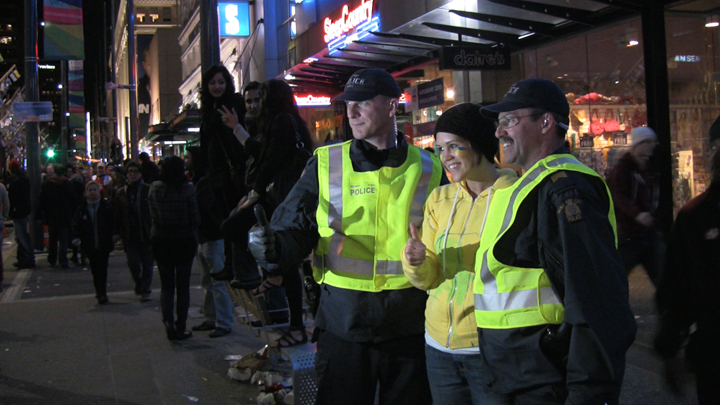
 RSS Feed
RSS Feed
